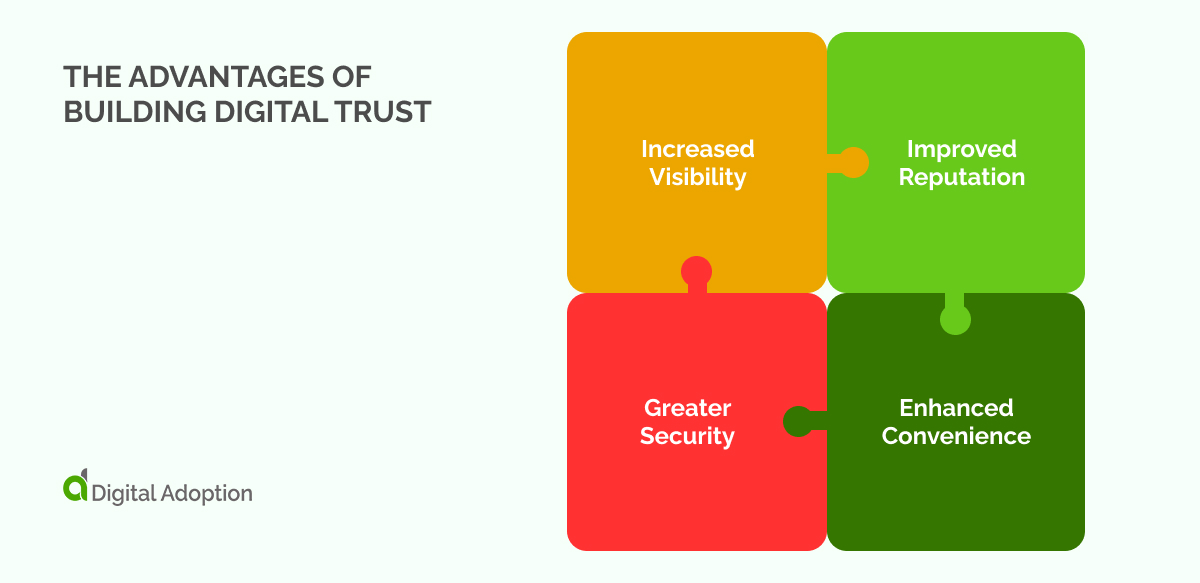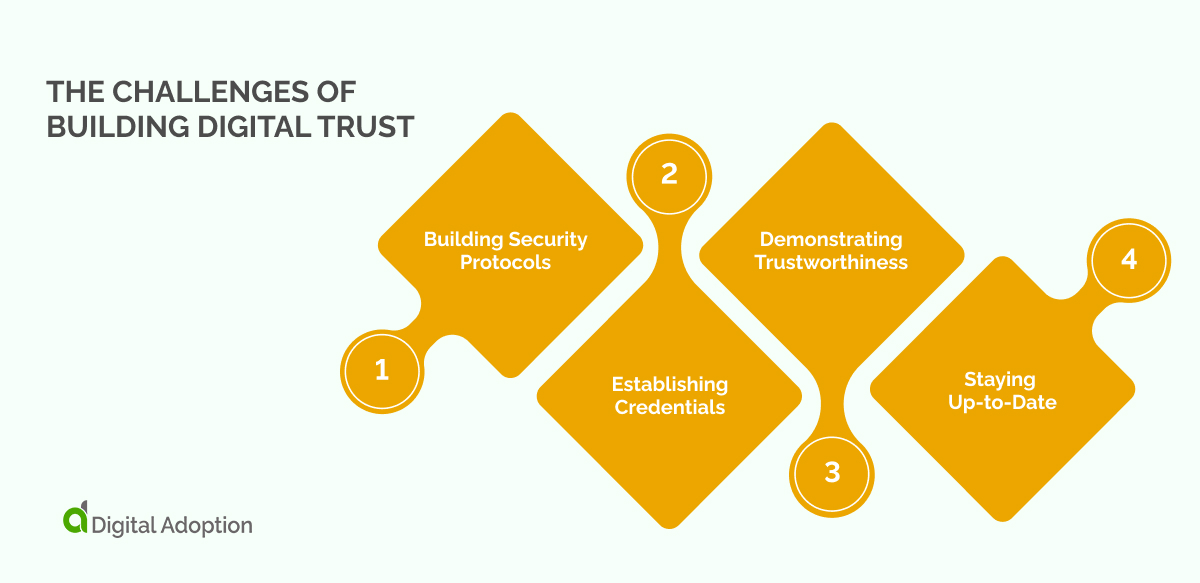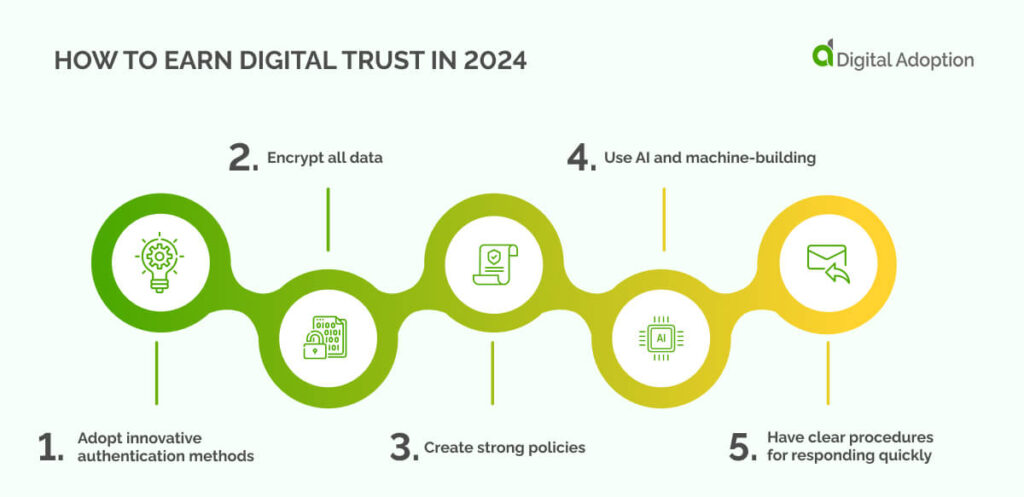The digital era has changed how businesses operate, creating new opportunities for digital transformation (DX) and digital adoption across various global sectors.
As such, any new endeavor brings a fresh set of problems. Business and digital leaders must now focus on establishing trust in their digital processes to ensure the security and privacy of transactions.
This is where digital trust comes into play.
Digital trust is becoming increasingly important for organizations looking to meet customer data responsibility and security expectations. From customer apps to digital marketplaces, organizations need to establish policies and processes that protect customer data from potential cyber-attacks and provide customers with trust in using their personal information.
PwC’s Global Digital Trust Insights Survey reveals that one out of every four companies worldwide (27%) have endured a data breach within the past three years, with losses ranging from US$1- 20 million. North American organizations report an even higher rate–34%, while only 14% of all surveyed firms worldwide have reported no data breaches in this time period.
Trust lies at the heart of digital transformation and digital adoption, as it builds a foundation of security, reliability, and confidence.
In this article, we explore the concept of digital trust and how it will impact industries in 2024. We will focus on why digital trust is important, the advantages of establishing it, how it works, and examples of success and challenges when trying to earn it. Last, we’ll discuss building and maintaining digital trust in 2024.
By the end of this piece, readers should clearly understand why creating and maintaining digital trust is necessary for success in today’s world.
- What Is Digital Trust?
- Why Is Digital Trust Important?
- How Does Digital Trust Work?
- The Advantages of Building Digital Trust
- The Challenges of Building Digital Trust
- How Is Digital Trust Impacting The Business Landscape In 2024?
- Leading By Example: Methods Companies Leverage To Earn Digital Trust
- How To Earn Digital Trust In 2024
- Digital Trust: Securing A Safe Digital Future
What Is Digital Trust?
Digital trust is people’s confidence in an online system or platform to protect their data and uphold ethical standards, such as user privacy.
Digital trust is a process, a state, and an objective which Gartner explains “underpins every digital interaction by measuring and quantifying the expectation that an entity is who or what it claims to be and that it will behave in an expected manner.”
Why Is Digital Trust Important?
It goes without saying – people are more likely to do business with companies and platforms they trust. This is especially true in the current digital era, where innovative tech continues to reshape our lives individually and collectively. In 2024, building digital trust will continue to gain traction as a key business strategy for cultivating long-term customer relationships.
According to Harvard Business Review, countries with secure digital environments and trusting attitudes are more likely to experience stability in terms of their digital evolution. This is illustrated by Denmark, Germany, Austria, and Sweden – all nations boasting a degree of trust coupled with efficient cyber security measures.
In contrast, those economies that demonstrate high rates of technological advancement often have less developed online safety systems and heightened anxiety around privacy matters.
No matter the jurisdiction, if a company fails to create an environment of trust, customers will take their business elsewhere. By examining and understanding digital trust and the five reasons why it is important, organizations can better protect their brands, reduce the risk of cyber-attacks, and gain customer loyalty. In addition, digital trust gives companies access to valuable customer data, which can be used to improve products and services.
Companies must be mindful of their customers’ trust when building relationships and long-term success. Digital trust is critical to this, as it helps build customer loyalty, safeguarding an organization’s brand and minimizing the risk of cybersecurity threats. As such, reexamining the five reasons why digital trust is important will be within the purview of any dynamic company.
How Does Digital Trust Work?
Digital trust is vital to the digital world and must be considered when operating in any online environment. It’s built on a combination of security measures, authentication processes, and verification protocols that ensure the data being exchanged is authentic and reliable.
By verifying the parties’ identity, digitally transmitted information can remain secure from end to end without interference. Digital certificates and fingerprints are two popular methods to authenticate user identities and transactions. Using biometric systems such as facial recognition and fingerprint authentication adds an extra layer of protection over traditional passwords, making it even harder for malicious actors to access sensitive data.
This helps create an environment where users can feel fully confident in their online interactions, allowing them to securely exchange data over digital networks without fearing exploitation.
The Advantages of Building Digital Trust

In an age of rampant fraud, cybercrime, and data privacy concerns, it’s crucial to establish credibility as a trusted source to your customers or users – but how? Here are some clear advantages of building digital trust:
- Increased Visibility: By building your target audience’s trust, you can reach out more easily for project help or collaboration. When people view you as a reliable source with good intentions, they may share resources or assist without strings attached. As you establish credibility, more individuals and organizations recognize your digital presence and will be willing to work with you.
- Improved Reputation: A strong online reputation is essential for any business looking to succeed in the digital world. By gaining the trust of your customers through verified qualifications, partnering with reputable vendors, and delivering quality results consistently over time, you can build a positive perception of your brand that will last even during difficult times.
- Greater Security: With data security at the forefront of everyone’s mind, having a security system is vital for any business striving for success online. Establishing protocols and safeguards will show customers that their information is safe in your hands – allowing them to thrive without fear of malicious attacks or interference from third parties.
- Enhanced Convenience: Having established credentials gives your customers confidence that they can access their accounts quickly and easily when needed – meaning they won’t have to waste time attempting multiple attempts or filling out tedious forms just to get into an account or purchase from your site.
The Challenges of Building Digital Trust

Gaining digital trust can be a complex and challenging path for many businesses. From a technological point of view, there are various threats to overcome, such as ransomware or data breaches. From a social standpoint, gaining customer trust can take time and effort as you endeavor to demonstrate your credibility over time. Here are some of the key challenges:
- Building Security Protocols: A lack of security protocols leaves any business open to various attacks – from malicious viruses and phishing attempts to simple human error. Establishing robust security measures is essential for any online operations, but this comes with challenges such as keeping up with technological advances, allocating resources effectively, and training staff on safety procedures.
- Establishing Credentials: Building credentials is important to building customer confidence – whether through verified qualifications or partnerships with reputable vendors and services. However, depending on the industry and an organization’s specific requirements, this can be difficult to gain approval or accreditation from governing bodies or associations within the field.
- Demonstrating Trustworthiness: A business’s attitude toward data privacy and cybersecurity can go a long way in determining how its customers perceive them. Customers favor companies proactively protecting their data through auditing processes, updated policies, customer service support systems, etc. As well as this, regularly demonstrating positive outcomes for customers will boost your reputation over time as people begin to associate your brand with trustworthiness and reliability.
- Staying Up-to-Date: As technology progresses day by day at an alarming rate, staying on top of security protocols and customer engagement trends is crucial for maintaining digital trustworthiness into the future – something which may become increasingly challenging depending on the size and resources available to an organization.
How Is Digital Trust Impacting The Business Landscape In 2024?
Digital trust will continue to be a much-discussed issue through 2024 and beyond. The evolution of technologies such as blockchain and artificial intelligence (AI) machine building (ML) has created a new world where trust is needed more than ever.
We are witnessing the emergence of new digital infrastructure, and companies increasingly rely on digital trust to protect their businesses and customers from cyber threats. As the amount of data companies house grows exponentially, they must ensure that this data is securely stored and protected from malicious actors.
This year, the FBI reported a record spike in cybercrimes and malicious activity across America, with ransomware attacking 649 vital infrastructure entities. Among the most serious threats are business email compromise and ransomware.
We expect to see an increased focus on building trusted digital environments for consumers and businesses. Digital trust will become the cornerstone for enabling secure transactions between parties over the Internet.
Leading By Example: Methods Companies Leverage To Earn Digital Trust
It is becoming increasingly difficult for consumers to know who and what to trust. Below are examples of a few companies leveraging digital trust to build customer relationships and create more enriching experiences.
WalkMe: WalkMe is enabling digital trust by leveraging data-driven insights to provide personalized training experiences, which reduces the risk of errors or incorrect usage and increases compliance with security protocols. Its integrated analytics feature allows organizations to monitor user behavior and detect any potential suspicious activities or breach attempts in real-time. This helps ensure that customer data remains secure and protected from malicious threats.
Okta: Okta is a technology company that provides a secure platform for enterprise customers to manage and protect their data across multiple devices and locations. They employ advanced technologies such as multi-factor authentication, single sign-on, and encryption to protect customer data from cyber threats.
Zscaler: Zscaler offers cloud security solutions that help businesses protect their cloud infrastructure from malicious activities and breaches. Their products provide visibility into user activity and protection against advanced persistent threats and data leakage risks.
Lucideus: Lucideus provides digital trust solutions that help organizations secure their digital assets through various cybersecurity measures, including perimeter security, identity management, access control management, threat intelligence, and more.
How To Earn Digital Trust In 2024

building digital trust requires organizations to adopt a culture of transparency and accountability. This means ensuring that users have access to all the necessary information about the security and privacy measures being taken and providing ways for customers to confirm the identity of those they trust online.
To achieve this, authentication methods are used to verify users’ identity, data is encrypted and stored securely on servers, and user information is kept confidential.
According to Gartner, within the next five years, 10% of large businesses will have established and trackable zero-trust programs – a substantial jump from their current rate of less than 1%.
Organizations must also have procedures to respond to security threats like phishing scams or malicious software. All of these work together to create an environment of trust that allows people to feel safe engaging with online services.
Gartner recommends that CISOs and risk management leaders begin by drafting a comprehensive zero-trust strategy that prioritizes security measures without compromising business operations.
Trust has become an essential part of the digital landscape, with customers expecting businesses to protect their data and maintain its confidentiality.
To build customer trust and establish a secure online presence, organizations must adopt innovative authentication methods, the most prominent of which are outlined below:
- Adopt innovative authentication methods like biometrics or two-factor authentication: Organizations can use biometric series such as fingerprint scans, facial recognition, and voice recognition to provide an extra layer of security. In addition, two-factor authentication can help users verify their identity with a combination of passwords and additional verification processes such as SMS codes sent to mobile devices.
- Encrypt all data sent over the internet: Encryption ensures that even if someone obtains access to user data, they cannot read it without the encryption keys. This helps protect user data from unauthorized access.
- Create strong policies about collecting, storing, and sharing user data, making it transparent to customers. Companies should create clear privacy policies that explain how customer data is collected, stored, and shared with third parties in a way that maintains confidentiality and trust. Customers should also be informed about these policies upfront to know what information is collected and why.
- Use AI and machine-building technologies to detect suspicious activities in real-time: AI can monitor for malicious activity on networks and quickly alert organizations about potential threats to take immediate action before any damage is done. Machine algorithms also allow for continuous monitoring so organizations remain proactive in defending their digital assets.
- Have clear procedures for responding quickly and effectively when security threats arise: Organizations must have well-defined response plans to address security threats efficiently with minimal disruption to operations or customer experience. These plans should include steps for mitigating risks, reporting incidents, restoring impacted systems, and communicating updates with customers throughout the process.
Digital Trust: Securing A Safe Digital Future
We live in a digital world where many transactions occur on a daily basis – from simple internet searches to remote purchases or interactions with cloud-based applications – so people need to be able to trust the systems they use daily.
Without this trust, users cannot be sure if their data is safe or if the site they interact with is genuine. This can result in lost trust in all digital services and less engagement with these technologies.
Digital trust gives consumers peace of mind in knowing that their practices and data are secure, allowing them to take risks without fear of repercussions. With a solid foundation of digital trust established, innovation can be encouraged rather than inhibited.
For everyone involved—consumers and companies alike—to fully benefit from digital technologies, their security and reliability must be assured. By cultivating strong levels of digital trust between users and companies, both parties can reap the rewards brought by these advancements while avoiding any potential pitfalls along the way.













